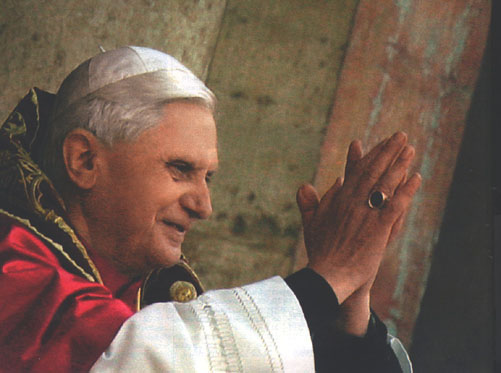 Rome, Dec. 11, 2006 (CWNews.com) – Pope Benedict XVI voiced his concerns about the Middle East, and particularly about Lebanon, during his Angelus audience on Sunday, December 10. Speaking to large crowd of about 40,000 people in St. Peter
Rome, Dec. 11, 2006 (CWNews.com) – Pope Benedict XVI voiced his concerns about the Middle East, and particularly about Lebanon, during his Angelus audience on Sunday, December 10. Speaking to large crowd of about 40,000 people in St. Peter
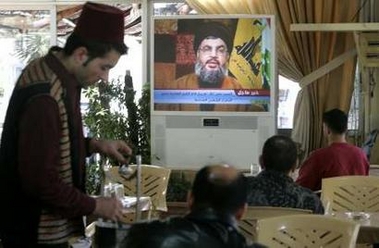 By Anthony Shadid, Washington Post, Two of Lebanon’s most powerful television stations played to their crowd. Future Television, loyal to Hariri and his Sunni constituency, devoted extensive coverage to the counterprotests in Tripoli. Hezbollah’s Al-Manar, calling the protests in Beirut “an unprecedented popular flood,” aired four scenes simultaneously of the crowds surging downtown. The broadcast was laced with the vocabulary of the summer war with Israel: victory, steadfastness and salvation.“People who survived 33 days of war in the south have no problem staying here for a year, or even two,” said Nada Mroueh, joining protesters flying flags that denoted their affiliation — yellow for Hezbollah, orange for Aoun, green for Amal. “Is it wrong to ask for our rights? Is Siniora more Lebanese than us? We are Lebanese, too.”
By Anthony Shadid, Washington Post, Two of Lebanon’s most powerful television stations played to their crowd. Future Television, loyal to Hariri and his Sunni constituency, devoted extensive coverage to the counterprotests in Tripoli. Hezbollah’s Al-Manar, calling the protests in Beirut “an unprecedented popular flood,” aired four scenes simultaneously of the crowds surging downtown. The broadcast was laced with the vocabulary of the summer war with Israel: victory, steadfastness and salvation.“People who survived 33 days of war in the south have no problem staying here for a year, or even two,” said Nada Mroueh, joining protesters flying flags that denoted their affiliation — yellow for Hezbollah, orange for Aoun, green for Amal. “Is it wrong to ask for our rights? Is Siniora more Lebanese than us? We are Lebanese, too.”
The demonstrators filled a swath of downtown and backed up into the main arteries leading into the city. Hezbollah has sought to cast the protest as representative of what it calls the national opposition, and the crowd unfurled a sea of the red, white and green Lebanese flag across downtown.
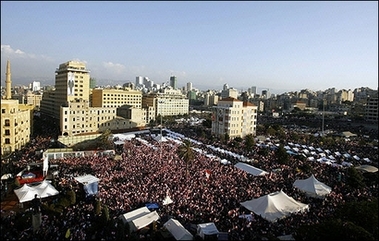 BEIRUT (AFP) – Lebanon’s divided factions are aiming for a political compromise after mass protests led by the opposition overwhelmed Beirut and raised fears of a return to civil strife. The protracted deadlock has paralyzed the government, opposition have clogged the capital in an escalating campaign to force a new national unity administration.
BEIRUT (AFP) – Lebanon’s divided factions are aiming for a political compromise after mass protests led by the opposition overwhelmed Beirut and raised fears of a return to civil strife. The protracted deadlock has paralyzed the government, opposition have clogged the capital in an escalating campaign to force a new national unity administration.
Arab diplomats were due in the capital to discuss a proposal with Prime Minister Fuad Siniora after securing the "agreement in principle" of the opposition which launched a rally on Sunday the army said was "unprecedented" in size.Arab League envoy Mustafa Ismail was to hash out details of a proposal for the opposition’s participation in the government after its six ministers pulled out last month. Sunday’s huge protest in Beirut came on the 10th day of a thousands-strong sit-in on the government’s doorstep, and was countered by a pro-government rally in Lebanon’s second city of Tripoli.
The opposition has accused the government of being weak and corrupt and is demanding that Siniora’s cabinet make way for a government of national unity.Siniora has accused the opposition of trying to mount a "coup," and pledged that his government will overcome the crisis, while repeatedly urging a return to talks.
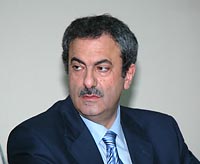 Magazine entretien Farid Elias el Khazen
Magazine entretien Farid Elias el Khazen
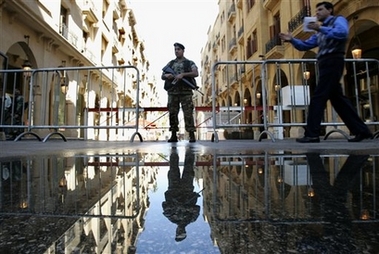 by Nayla Razzouk, The opposition, made up of Shiite and Christian factions, has held demonstrations outside Prime Minister Fuad Siniora’s offices in central Beirut. Deep political tensions in Lebanon and a number of street fights that have killed at least one Shiite sympathizer have raised concerns of a resurgence of sectarian strife in a country still reeling from the 1975-1990 civil war.
by Nayla Razzouk, The opposition, made up of Shiite and Christian factions, has held demonstrations outside Prime Minister Fuad Siniora’s offices in central Beirut. Deep political tensions in Lebanon and a number of street fights that have killed at least one Shiite sympathizer have raised concerns of a resurgence of sectarian strife in a country still reeling from the 1975-1990 civil war.
Some newspapers even hinted that the opposition may be planning to paralyze the airport, ports, and roads in a civil disobedience action that could be launched Monday.Opposition officials refused to comment.Hezbollah leader Hassan Nasrallah pledged in a fiery speech late Thursday that the opposition will not "surrender," but he also said "the doors of negotiation are still open."Nasrallah hailed a proposal for a solution made by the influential Maronite Archbishops’ Council which called Wednesday for the formation of an "accord government" .The proposal "has a lot of positive elements and is worth considering," Nasrallah said in his televised speech to thousands of protestors who have been camping outside Siniora’s offices since last week.And on Friday, a Hezbollah delegation, lead by the head of the Hezbollah parliamentary bloc MP Mohammed Raad, visited Bkerke, the seat of the Maronite patriarchate northeast of Beirut, said a Hezbollah spokesman."They will of course discuss what Sayyed Nasrallah talked about when he mentioned the archbishops’ proposal," he told AFP. The Free patriotic movement lead by General Aoun also embraced the Archbishops’ Council, and accepting it fully.
The "March 14" ruling majority also backed the archbishops’ proposal in an overnight statement that called for resolving the crisis through dialogue."We hail the statement by the Maronite archbishops… which reflects the spirit of national unity," it said."We reject any kind of violence and confrontations and we believe that strikes and ongoing sit-ins will not help resolve the Lebanese problem."
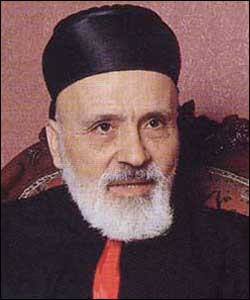 Daily star By Maroun Khoury and Therese Sfeir, BEIRUT: Lebanon’s fragmented political class Thursday seemed able to agree, for the most part, in its support for a "declaration of principles" issued by the Maronite Church. Hizbullah politburo member Hajj Ghaleb Abu Zeinab described the declaration as "positive in its general aspect," but said it contained "a few details that should be discussed." "There are several meeting points between the opposition’s demands and Bkirki’s declaration," Abu Zeinab told the Central News Agency.
Daily star By Maroun Khoury and Therese Sfeir, BEIRUT: Lebanon’s fragmented political class Thursday seemed able to agree, for the most part, in its support for a "declaration of principles" issued by the Maronite Church. Hizbullah politburo member Hajj Ghaleb Abu Zeinab described the declaration as "positive in its general aspect," but said it contained "a few details that should be discussed." "There are several meeting points between the opposition’s demands and Bkirki’s declaration," Abu Zeinab told the Central News Agency.
He said those meeting points included the implementation of "a code of honor" that would apply to all parties, the creation of an international tribunal to try former Premier Rafik Hariri’s killers, a new electoral law, and the formation of a "reconciliation" government that would hold early presidential elections. But while Bkirki said a new electoral law should be based on the qada, "others have different views about the law," Abu Zeinab said. But the Hizbullah official said the presidency was "not a main obstacle that would prevent us from resolving the crisis." For its part, the Reform and Change parliamentary bloc offered its "full support" Thursday to the Church’s declaration, saying it considered the declaration to be "the basis for a comprehensive solution to Lebanon’s current crisis." Speaking after a separate meeting with Sfeir Thursday, former MP Fares Soueid from the March 14 coalition urged the opposition to end a week-long demonstration in the capital and abide by the declaration.
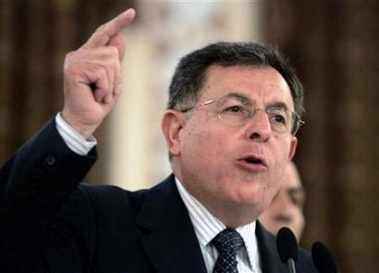 By Crispian Balmer , BEIRUT (Reuters) – A Lebanese Sunni preacher lead thousands of anti-government Shi’ite protesters in Friday prayers at a tent camp in central Beirut in a show of Muslim unity.
By Crispian Balmer , BEIRUT (Reuters) – A Lebanese Sunni preacher lead thousands of anti-government Shi’ite protesters in Friday prayers at a tent camp in central Beirut in a show of Muslim unity.
The opposition is escalating a protest campaign to topple the government of Prime Minister Fouad Siniora despite fears of sectarian strife.Shi’ite Hezbollah one of the most powerful force in the opposition while Siniora is a Sunni and his main backer, parliamentary majority leader Saad al-Hariri, is also a Sunni.Preacher Fathi Yakan, who leads a small pro-opposition Sunni group, will lead the noon prayers. Hezbollah chief Sayyed Hassan Nasrallah urged supporters on Thursday to attend the sermon to display Muslim unity.
"There will not, will not, be fighting between Shi’ites and Sunnis in Lebanon," Nasrallah told tens of thousands of supporters in central Beirut via a live video link.Nasrallah vowed to pursue his demand for a government of national unity and told Siniora to agree swiftly or face the prospect of new opposition demands for a transitional administration leading to early parliamentary elections.
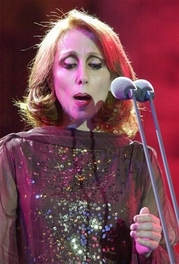 By DONNA ABU-NASR, Associated Press Writer , BEIRUT, Lebanon – Her voice brought together under one roof both supporters of the beleaguered government and opponents trying to topple it. Yet in this tense country, sharp disputes break out even at a performance by Fairouz, Lebanon’s premier diva and the star of a musical about a corrupt government. Last weekend’s three-night run of "Sah el-Nom," loosely translated as "A Good Night’s Sleep," was supposed to open an annual summer festival in the ancient city of Baalbek. Israel’s July-August offensive on Lebanon forced organizers to postpone until December, hoping that by then calm would prevail.But opening night coincided with a new crisis that many fear could tear apart the country
By DONNA ABU-NASR, Associated Press Writer , BEIRUT, Lebanon – Her voice brought together under one roof both supporters of the beleaguered government and opponents trying to topple it. Yet in this tense country, sharp disputes break out even at a performance by Fairouz, Lebanon’s premier diva and the star of a musical about a corrupt government. Last weekend’s three-night run of "Sah el-Nom," loosely translated as "A Good Night’s Sleep," was supposed to open an annual summer festival in the ancient city of Baalbek. Israel’s July-August offensive on Lebanon forced organizers to postpone until December, hoping that by then calm would prevail.But opening night coincided with a new crisis that many fear could tear apart the country
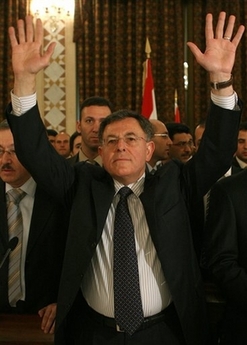 In a televised message to the nation on Thursday night, Prime Minister Fuad Saniora affirmed that his government
In a televised message to the nation on Thursday night, Prime Minister Fuad Saniora affirmed that his government
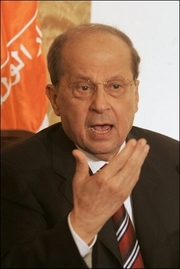 by Salim Yassine BEIRUT (AFP) – Lebanese leader Michel Aoun has vowed that the opposition will escalate its street protests if the Western-backed government fails to accept demands for a unity cabinet. "If the prime minister (Fuad Siniora) and his camp continue to monopolize power, there will be an escalation of popular pressure," Aoun, 71, told AFP in an interview Wednesday.
by Salim Yassine BEIRUT (AFP) – Lebanese leader Michel Aoun has vowed that the opposition will escalate its street protests if the Western-backed government fails to accept demands for a unity cabinet. "If the prime minister (Fuad Siniora) and his camp continue to monopolize power, there will be an escalation of popular pressure," Aoun, 71, told AFP in an interview Wednesday.
"We will paralyze the government, we will force it to go into a deep coma."The Hezbollah-led opposition, made up of different factions, has held demonstrations since Friday outside Siniora’s offices in Beirut where he and several ministers have been holed up.The opposition is seeking a greater say in the Siniora government, which is dominated by an anti-Syrian parliament majority but is hanging by a thread after six pro-Damascus ministers quit. Siniora’s coalition has accused the opposition of seeking to block a cabinet decision for an international tribunal to try suspects in the 2005 murder of former premier Rafiq Hariri, widely blamed on Syria
The tense situation in the capital has led to two consecutive nights of street fights between followers of the two camps that left one man dead and 15 others wounded."If Siniora wants to negotiate, he will have to present us some proposals, but we will not accept anything less than true power-sharing and a blocking minority share" in the government, said Aoun.
.



